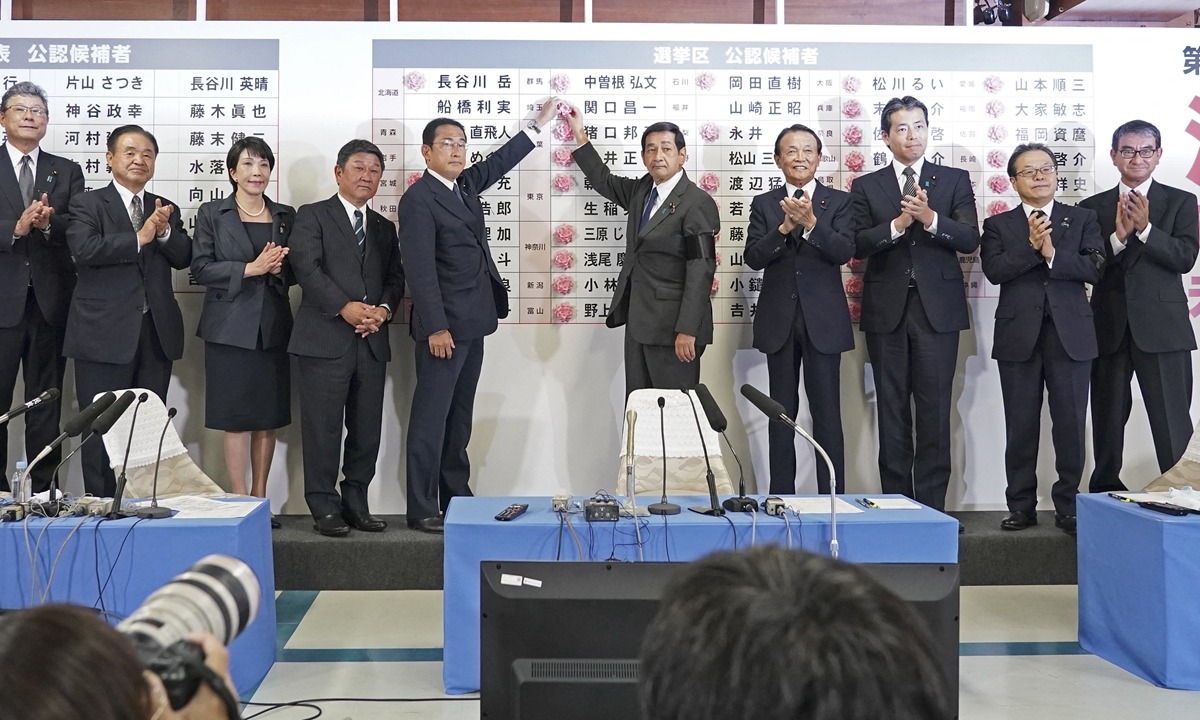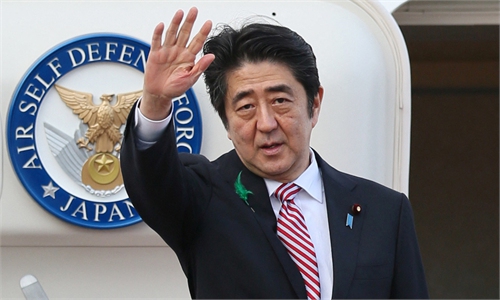Abe’s killing turns Japan upper house election into ‘war of condolences’
Japan poised to be more aggressive in region with few balanced voices: observers

Japan's Prime Minister and President of the Liberal Democratic Party (LDP) Fumio Kishida (center L) places a red paper rose on an LDP candidate's name to indicate the victory in the upper house election, along with his party executives at the party's headquarters in Tokyo on July 10, 2022.
Two days after Shinzo Abe, 67, Japan's longest-serving modern prime minister, was shot dead on Friday while making a speech in support of a local candidate in the Western Japanese city of Nara, Japan's ruling party scored a sweeping victory in Sunday's House of Councillors election.
Prime Minister Fumio Kishida's Liberal Democratic Party and its junior coalition partner Komeito won more than 70 of the 125 seats up for grabs. That outcome allowed the ruling bloc to retain a majority in the 248-member upper chamber of parliament, Kyodo News reported.
The pro-constitutional amendment camp, comprising the LDP-Komeito coalition, two opposition parties and independents, crossed the 166-seat threshold in the upper chamber needed to push for a first-ever revision of the 1947 Constitution, according to Kyodo.
Abe's death served as a "symbol" through which the LDP conservative forces could gain more sympathy from the Japanese public, Da Zhigang, director of the Institute of Northeast Asian Studies at Heilongjiang Provincial Academy of Social Sciences, told the Global Times on Sunday.
Experts said Abe's killing turn Japan upper house election "war of condolence."
With the Japanese ruling coalition set to win the election, Japan will speed up the process of revising its pacifist constitution under the banner of "inheriting Abe's legacy," Lü Yaodong, a research fellow with the Institute of Japanese Studies under the Chinese Academy of Social Sciences, told the Global Times on Sunday.
Approval by a two-thirds majority in both houses is required for any revision to Japan's postwar pacifist constitution to be initiated.
If the constitutional amendment succeeds in the future, Japan is likely to get rid of the constraints of its pacifist constitution, will be able to participate in wars overseas and join the aggressive multilateral organization NATO, and will seek to develop into a military power, which will be very harmful to Japan, the Asia-Pacific region as well as the entire world, Chinese observers warned.
Conservative attitudes in Japanese society are likely to be further strengthened, which will certainly lead to a hardening of relations with Japan's neighboring countries, they said.
An investigation has been launched into the assassination that has shocked Japan and the world. While many details will still need to be fleshed out about the suspect who was arrested at the scene of the fatal shooting on Friday, a broad picture has come into focus.
The cause of Abe's death was loss of blood, Nara prefectural police announced Saturday after performing an autopsy, the Asahi Shimbun reported on Saturday. A top police official on Saturday acknowledged possible security lapses that allowed an assassin to fire his gun at Abe twice, raising questions over how the attacker was able to get so close behind him, AP reported.
According to the NHK, Japanese police transferred the 41-year-old suspect Tetsuya Yamagami to the Nara's Prosecutor's Office on Sunday morning on suspicion of murder. He was arrested on Friday on suspicion of attempted murder for shooting Abe, the NHK report said.
The suspect used a homemade gun in the shooting, police said. Authorities later confiscated several handmade pistol-like items from the suspect's apartment, Japanese media reported.
People who had interacted with Yamagami expressed shock that such a "totally normal" and seemingly "earnest" person would kill their country's powerbroker on a crowded street, Japanese media said.
Yamagami, who is unemployed, told investigators he holds hatred toward a certain group that he thought Abe was linked to. The suspect told investigators that his mother had made a large donation to the religious organization and that his family was ruined as a result, according to Japanese media reports. Police have not named the group.
However, some Japanese media have revealed that the religious group is the Unification Church based in Seoul, South Korea. According to Gendai Business, a Japanese magazine, Yamagami told investigators that his mother was a believer of the Unification Church and Abe was close to the religious group. A conservative political organization under the religious group was founded in 1968, and is said to be closely related to the conservative members of the LDP, reported Gendai Business on Saturday, which noted that the relationship between Abe and the religious group has been talked about online for some time.
Another Japanese gossip magazine Flash also mentioned the Unification Church in its latest update on Abe's assassination.
The Japanese mainstream media reported that Yamagami had told investigators he initially considered attacking a senior official of the religious group, but gave up after deciding it was too difficult. Yamagami then turned his focus on Abe, whom he regarded as having a link with the group.
The Unification Church expressed shock and grief over Abe's assassination in a statement on Sunday, according to the PRNewswire. The statement did not mention the group's link with Abe.
US-Japan alliance 'to be further promoted'
While world leaders have been paying respects to Abe over his assassination, Washington showed just how much importance it attached to expressing its condolences over the former Japanese prime minister's death.
US Secretary of State Antony Blinken will make an unscheduled stop in Tokyo on Monday to offer condolences over Abe's death, the US State Department said on Saturday.
Kyodo News on Sunday cited a Japanese official as saying that Japanese Prime Minister Fumio Kishida will receive a courtesy call from Blinken on Monday morning.
Also on Friday, US President Joe Biden said he had ordered US flags to be flown at half-mast through Sunday to honor Abe.
"The US-Japan Alliance is the cornerstone of peace and stability in the Indo-Pacific and has never been stronger," the US State Department said in the Saturday' statement.
Chinese observers believe that the US-Japan alliance will be upgraded to a higher level, which is also something that Kishida will push forward.
Kishida would be more forceful than Abe in strengthening the US-Japan alliance, and the two countries will become more aggressive in targeting China, said Lü Yaodong.
The US is trying to collude with two allies - Japan and South Korea - to form a tight security framework under the banner of "safeguarding" security in East Asia, Lü warned.
Abe's death triggered mourning worldwide, which became a rare "diplomatic legacy" for Japan and facilitated "condolence diplomacy" for the Kishida administration, Chinese observers said. But some observers believe that the West, especially the US, will lose some support for its "Indo-Pacific Strategy" after the loss of the key Japanese figure in shuttle diplomacy.
South Korean President Yoon Suk-yeol will soon visit a memorial altar set up by the Japanese Embassy in South Korea to pay his respects to Abe, the presidential office said Sunday, according to the Korea Herald.
Yoon also plans to send a delegation to Japan to offer condolences when an official memorial service is scheduled, according to the media report.
On Saturday, Chinese President Xi Jinping sent a message of condolences to Kishida on the "sudden and unfortunate" passing of Abe. Chinese Premier Li Keqiang also sent condolences to Kishida on Saturday.
For the Chinese public, Abe was a controversial political figure - he had improved Japan's relations with China to certain extent, marked by two icebreaking trips during his second term in 2013 and 2018 - but his remarks and actions, including frequent visits to the infamous Yasukuni Shrine, a memorial that enshrines Japan's infamous Class-A war criminals who symbolized Japan's war atrocities and militarism during World War II, and denial of Japan's invasion history, led to his gaining a bad reputation, in China as well as in other Asian countries.
Observers pointed out that the century-old grudge between China and Japan since the War of Resistance against Japanese Aggression (1931-45) has made it impossible to expect Chinese netizens to have "deep sorrow" for Abe. The Chinese authorities have expressed appropriate condolences on Abe's death, which is a show of Chinese cultural courtesy as well as Chinese political rationality, observers said.


